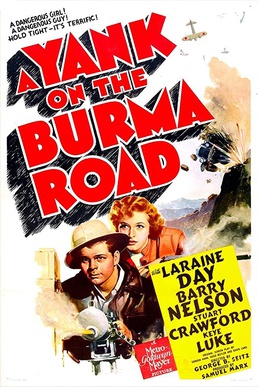A Yank on the Burma Road
1942 film by George B. Seitz From Wikipedia, the free encyclopedia
A Yank on the Burma Road is a 1942 drama film directed by George B. Seitz and starring Laraine Day, Barry Nelson and Keye Luke. It is also known as China Caravan and Yanks on the Burma Road.
| A Yank on the Burma Road | |
|---|---|
 | |
| Directed by | George B. Seitz |
| Written by | Hugo Butler David Lang Gordon Kahn |
| Produced by | Samuel Marx |
| Starring | Laraine Day Barry Nelson Keye Luke |
| Cinematography | Lester White |
| Edited by | Gene Ruggiero |
| Music by | Lennie Hayton |
Production company | |
| Distributed by | Metro-Goldwyn-Mayer |
Release date |
|
Running time | 67 minutes |
| Country | United States |
| Language | English |
| Budget | $300,000[1] |
| Box office | $552,000[1] |
It was produced as part of a cluster of Hollywood films set during the Burma campaign of World War II.[2] Although released shortly after America's entry into the conflict, it was largely produced before the Attack on Pearl Harbor.[3] The film's sets were designed by the art director Edwin B. Willis.
Plot
Summarize
Perspective
A New York City taxi driver Joe Tracey attracts public attention by capturing the Spinaldi brothers, two notorious killers, and handing them over to the police. He is then hired by Chinese representatives who want him to take a valuable convoy of medical supplies on the Burma Road from Rangoon to the Republic of China's capital at Chungking. There he meets fellow American Gail Farwood who has been denied permission to travel to Chungking because the British authorities suspect her on account of her German-born pilot husband of being pro-Japanese agent. Tracey agrees to take Gail with him, but is surprised at her attempts to evade the Chinese authorities. Having originally taken the job purely for the money, Tracey is moved by the suffering and resolve he encounters on the way. They come across Gail's husband Tom, in the custody of the Chinese, and agree to take him to Chungking for trial. On the way a fierce battle breaks out between the Japanese attackers and Chinese forces, during which Tom is killed trying to aid the former. The attack is repulsed and the convoy proceeds on its way, news having arrived that America has now entered the war following the bombing of Pearl Harbor.
Reception
The film made $355,000 in the United States and Canada and $197,000 elsewhere, making a profit of $64,000.[1]
Cast
- Laraine Day as Mrs. Gail Farwood
- Barry Nelson as Joe Tracey
- Stuart Crawford as Tom Farwood
- Keye Luke as Kim How
- Victor Sen Yung as Wing
- Philip Ahn as Dr. Franklin Ling
- Knox Manning as Radio Announcer
- Matthew Boulton as Rangoon Aide de camp
- James B. Leong as Guerilla Leader
- Marcelle Corday as Madame Vercheron
- George Magrill as A Spinaldi Brother
- Cy Schindell as A Spinaldi Brother
- Eddy Chandler as Police Desk Sergeant Mulvaney
- Cliff Clark as Police Lieutenant
- James Flavin as Police Radio Dispatcher
- Luke Chan as Officer
- Richard Loo as Commandant
- Allen Jung as Taxi Driver
- Chester Gan as Doctor
- Harry Semels as Partner
- Bob Okazaki as Japanese Officer
- Eddie Lee as Chinese Lieutenant
References
Bibliography
External links
Wikiwand - on
Seamless Wikipedia browsing. On steroids.
